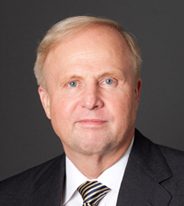BP Defends High Capex 2017 Outlook
BP made a net profit of $497mn in 4Q 2016, reversing a loss of $3.3bn in the same 2015 quarter. Full year 2016 profit was $115mn, compared to a loss of $6.48bn in 2015.
Underlying replacement cost profit for the whole of 2016 though was $2.6bn, down from $5.9bn in 2015. CEO Bob Dudley however said that BP finished the year ahead of where it had expected to be.
Reported production in 4Q2016, including BP’s share of Rosneft’s production, was 3.338mn barrels of oil equivalent/day day (boe/d), compared with 3.342mn boe/d for the same period in 2015. Full year 2016 production was 3.268mn boe/d, compared with 3.239mn boe/d in 2015.
Capital expenditure was $16bn and is now forecast to be $16bn-$17bn in 2017, compared to BP’s earlier forecast of $15.5bn for 2017. Dudley said this was because of additional new major projects taken on board.

BP CEO Bob Dudley (Photo credit: BP)
Some analysts however expressed concern at an apparent relaxation of BP’s capex discipline. Finance chief Brian Gilvary responded that BP expects to have 800,000 boe/d new production from its new projects by 2020. Many of the deals – such as on Zohr in Egypt, and the Abu Dhabi ADCO extension – reached in 4Q 2016 had been worked on for some time but came together in the last quarter, he said. BP agreed in November 2016 to pay $375mn cash for a 10% stake in the giant Egyptian Zohr gas field development, with the option to buy a further 5% later.
Dudley said many such projects extend the company’s production lifetime, citing in particular an agreement over the ACG gasfield in Azerbaijan extending Socar-BP cooperation out to 2050.
Dudley also said that at BP's Khazzan tight gas project in Oman, where a 50% increase in its scope and acreage was agreed with the government in November, the original project plus the 50% expansion would be achieved for the same cost as the original Khazzan project FID cost.
Drilling costs had come down more widely, said Dudley, while the cost of steel pipes across Turkey (Tanap) for Shah Deniz gas had also decreased.
BP’s net debt increased to $35.5bn at end-2016, compared to $27.2bn a year earlier. Divestment proceeds in 2016 were $3.2bn and are expected to be $2bn-$3bn in 2018. However with Deepwater Horizon commitments now clarified in 2016, Dudley said BP was more fully focused on the future. It had added to its portfolio with new partnerships.
CFO Brian Gilvary said that total payments and provisions associated with US Gulf of Mexico oil spills was a cumulative $62.6bn to end-2016, of which $7.1bn in 2016 itself, including $800mn in 4Q. Net of tax, those figures were $41.4bn to end-2016, with $530mn incurred in 4Q 2016.
Gilvary pointed to higher year-on-year gas and oil prices, with Henry Hub gas at $3/mn Btu (from $2.30) and Brent at $49/b. Prior to the Opec agreement, in 3Q 2016 Brent was $46. Dudley said that BP expects a worldwide OECD oil inventory of 3mn bbls to be eroded by end-2017 if Opec sticks to its commitments. Dudley said his sense from meetings with "steely" Opec and Russian industry chiefs was that the latest Opec deal was holding.
In Egypt, Dudley said that a further West Nile Delta gas project would come onstream this summer: “We think Egypt has great potential as a gas market,” he said, noting Zohr. Gilvary said risk in terms of receivables in Egypt was “significantly reduced” to BP compared with five years ago.
The company pointed to six major project start-ups in 2016, including expansions of In Salah (February) and In Amenas (autumn) gas in Algeria, and resumed production from Angola LNG (May).
Mark Smedley



